The Crucial MX500 500GB SSD Review: A Second Look
by Billy Tallis on February 2, 2018 9:30 AM ESTAnandTech Storage Bench - Light
Our Light storage test has relatively more sequential accesses and lower queue depths than The Destroyer or the Heavy test, and it's by far the shortest test overall. It's based largely on applications that aren't highly dependent on storage performance, so this is a test more of application launch times and file load times. This test can be seen as the sum of all the little delays in daily usage, but with the idle times trimmed to 25ms it takes less than half an hour to run. Details of the Light test can be found here. As with the ATSB Heavy test, this test is run with the drive both freshly erased and empty, and after filling the drive with sequential writes.
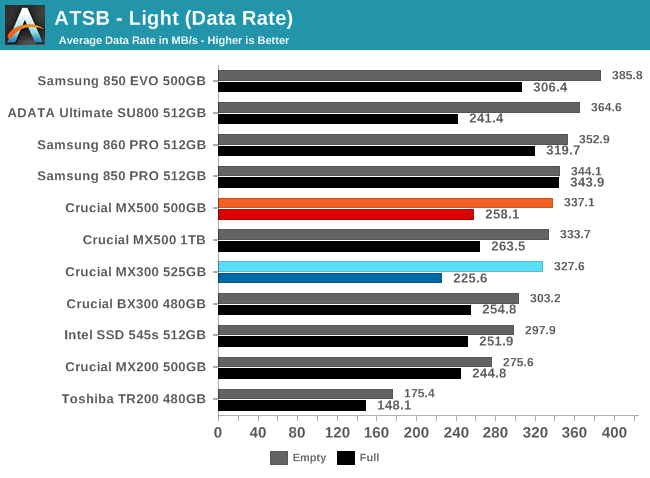
Most drives show a larger difference between full drive and empty drive performance on this Light test than on the Heavy test. Like the MX300, the Crucial MX500 continues to show a more pronounced full-drive performance hit than most of its competition. This effect has been reduced so that the MX500 is faster than all the earlier Crucial drives whether the test is run on an empty drive or full drive. Peak empty-drive performance hasn't improved much, so Crucial hasn't caught up to Samsung.
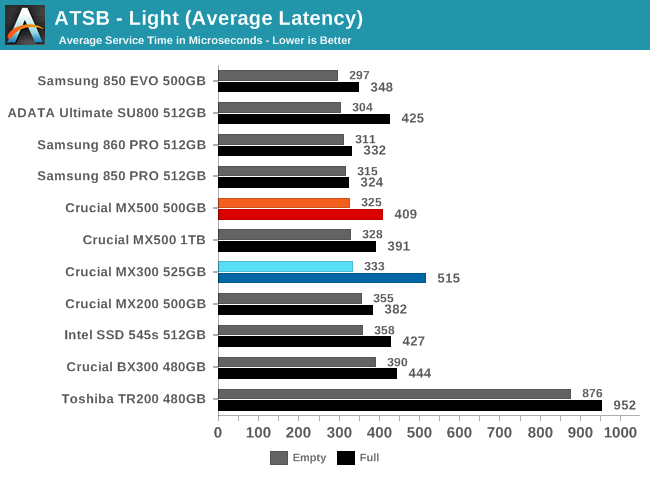
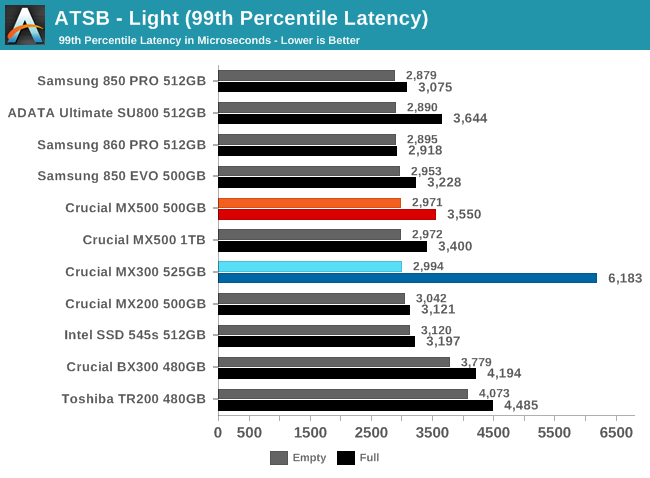
The Crucial MX500's average and 99th percentile latency scores when the Light test is run on a full drive show a bit more performance drop than most of its competition, but it is not a big outlier the way the MX300 was.
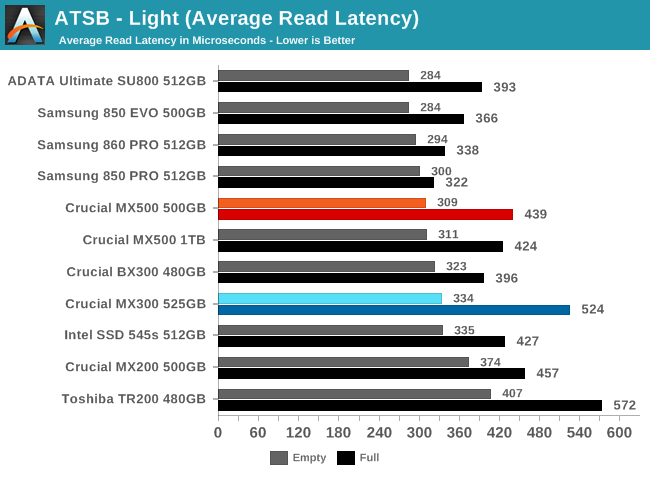
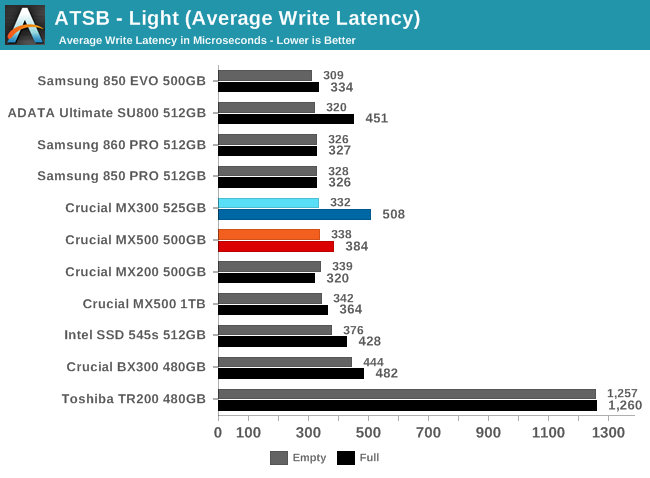
The full-drive average read and write latencies for the Crucial MX500 are a bit higher than what Samsung's drives deliver, but overall the MX500's latency is pretty good.
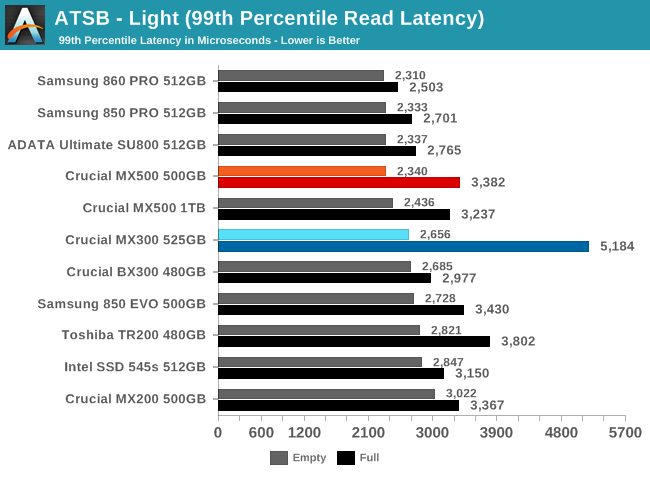
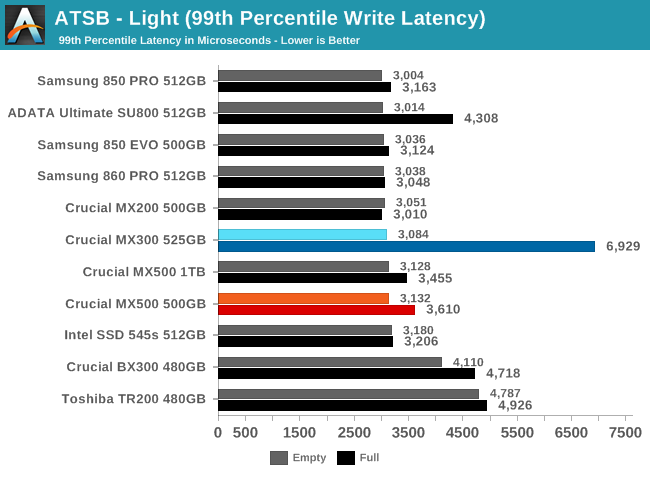
The Crucial MX300's 99th percentile read and write latencies were both significant outliers among mainstream SATA drives, while the MX500 blends in with more or less the same quality of service level as the competition.
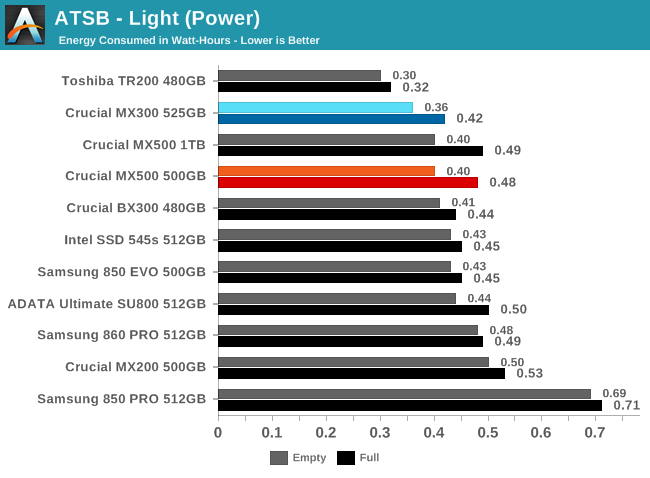
As with the other ATSB tests, the Crucial MX500 draws more power than the MX300, but this time it remains one of the most efficient mainstream SATA SSDs, albeit with a small lead.










25 Comments
View All Comments
jordanclock - Friday, February 2, 2018 - link
Generally, any good SATA SSD is going offer much the same performance as any other model. The gains when going from the second (or even fifth) best SSD on SATA to the absolute best are tiny. Plus, given the capacity you would want for a console, I think going for a 'mediocre' SSD will offer all the performance you need without spending twice as much for less than one second load time differences.leexgx - Tuesday, February 20, 2018 - link
this is true once you have a SSD (any) in a console your purely limited by the CPU speed and ram in the PS4 or xbox it self (some youtubers have tested it) even to the point the SSHD from seagate and toshiba after the second load is nearly the same as a SSD (but it has to have read the data before so if you load the same game or save twice for it work well witch mite happen if you die a lot and fall back to a checkpoint save) if you switch between games SSHDs can at times offer not as much benerfitstill can't beat SSDs for consistency as it always be the same speed
tamalero - Friday, February 2, 2018 - link
Those prices feel really nice!Hurr Durr - Sunday, February 4, 2018 - link
It's not nice until we hit around 10 cents for the gigabyte.zirk65 - Friday, February 2, 2018 - link
Looks similar to the MX200, but with bigger pipes and better thermals.MX200 = MLC NAND / Marvel Controller
MX500 = TLC NAND / Silicon Motion Controller
Yet I wonder much is different between the controller uArch these days, outside of specific I/O and power functions.
mode_13h - Friday, February 2, 2018 - link
Last I checked, Crucial's MX-series SSDs featured end-to-end data protection. Does Samsung offer anything like that, in their consumer drives?letmepicyou - Friday, February 2, 2018 - link
Say Mr. Tallis, I'm sure I'm not alone when I ask this (feel free to chime in, guys) but there are those of us out here who want the greater capacity of a 1tb drive whilst not wanting to fork over 1tb drive prices. I can RAID 0 a pair of ~500gb drives and get better performance than a single 1tb drive, while spending $60-$120 less.What I'm saying is, I would love to see how your arsenal of ~500 gb drives perform in RAID. I have a feeling others would like to see the same information.
Billy Tallis - Friday, February 2, 2018 - link
You can't get a pair of 500GB drives for $60 less than the price of a 1TB drive from the same product line, unless you're looking at an unusually good sale on the 500GB drives and not looking for the best price on a 1TB drive. Every 1TB SATA drive I price checked this week was cheaper per GB than its half-TB counterpart.As for RAID testing, my collection of drives almost never includes more than one of each. At the moment I'm finishing up a NVMe RAID review using a set of drives that was loaned by a vendor specifically for this review. Between the disappointing results I'm getting from that project and the prices I'm seeing that don't make SATA RAID economical either, it's not a priority for me to test SATA RAID.
Wardrop - Saturday, February 3, 2018 - link
Is that a software raid or hardware raid you used for your NVMe raid review. I'm guessing software as I'm not even sure any NVMe raid solutions exist. In that case, I imagine we're back to needing dedicated RAID controller to deal with the order of magnitude increase in drive performance compared to HDD's, and then obviously you're left questioning who needs double the increase in sequential performance when a single drive is usually more than fast enough for any sequential workload.peevee - Monday, February 5, 2018 - link
Check m.2 PCIe/NVMe 1TB and 2TB prices.But you'll need an MB with 2 M.2 slots with 4x PCIe connected to CPU, are those even available? Otherwise latencies will dominate the performance (like for M.2 which only provide SATA, either slots or drives).